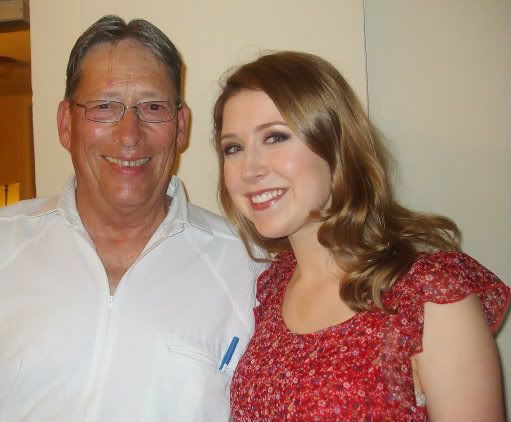Post by postscript on Jan 23, 2008 18:40:37 GMT
Your reply 74 in this thread Socalboy raises several points I left out of my own comment--it is the quality of the interviewer for which we have much to thank. I would go so far as to say, with perhaps one or two 'women's angle' interviews dealing with the daughter/parent relationship, or her adapting to living alone etc, this is the first time she has been interviewed by 'someone of substance', probably because there were two interviews: one with her and one with James Horner.
There is series of programmes that comes on TV UK periodically the title of which is eluding me, it is a specialist arts programme with top rate interviewers who have properly researched the background and gone into great depth of interpretation with their interviewees. I cannot think of it... Dave.., Richard..., Roger? Its not 'Film on 4' but a 'high-brow' across the arts programme of that nature. They did two on the novelist Graham Greene over the years.
[It came to me over breakfast this morning in time to add this amendment. The programme was a BBC2 series 'Arena' made up of specially researched programmes concentrating on one artist from any branch of the arts.]
This is an interview in which the 'real Hayley' has been allowed to emerge and as I said in my own post we have learned more about the professional Hayley than her autobiography tells us. This is understandable because her autobiography is just that, her version of her life to date for the generally interested reader.
This is where Libby Purves failed in her interview with Hayley--Purves was more concerned with 'Libby Purves presents' than bringing out her interviewees for themselves. That too may be due to the nature of her programme--to an extent--but I still feel that Libby Purves is out for Libby Purves, not to get the best from her guests.
This interview probes deeply into Hayley. It really starts to flesh out the skeleton we have been aware of. What have I learned about Hayley from this interview? NOTHING! Nothing that I had not already guessed and hoped was behind the curtains backstage in the Green Room that leads to her stage performances.
It shows the depth and diversity of her life awareness, the intensely enquiring mind and her desire to grasp and understand all that she can. Unusually for anyone of this nature, let alone one so young, she shows an extraordinary patience to absorb in the project's own time all that needs to be grasped to master what is needed.
For those who have the professionalism to be good enough to be privileged to work with her or share the stage with her, she must be an absolute joy... as well as, perhaps, something of a challenge? No wonder the choir at Bath sidled out to watch her perform her solos. They knew the privilege was theirs to be on the same programme with her.
Peter S.
Addendum. I rather suspect I shall come back to this time and time again. I have resisted going through it and noting the points but every time I read it I see something else.
My current new excitement is this quote:
How do you do to listen to the wind?
This immediately brought to my mind the pictures for 'Odyssey'. Look again at those booklet pictures, 'The wind is in her hair'. This interview highlights so many subtle statements of who she is that have been before our eyes, the significance of which we can now appreciate but how many of us have noticed other than subliminally?
There is series of programmes that comes on TV UK periodically the title of which is eluding me, it is a specialist arts programme with top rate interviewers who have properly researched the background and gone into great depth of interpretation with their interviewees. I cannot think of it... Dave.., Richard..., Roger? Its not 'Film on 4' but a 'high-brow' across the arts programme of that nature. They did two on the novelist Graham Greene over the years.
[It came to me over breakfast this morning in time to add this amendment. The programme was a BBC2 series 'Arena' made up of specially researched programmes concentrating on one artist from any branch of the arts.]
This is an interview in which the 'real Hayley' has been allowed to emerge and as I said in my own post we have learned more about the professional Hayley than her autobiography tells us. This is understandable because her autobiography is just that, her version of her life to date for the generally interested reader.
This is where Libby Purves failed in her interview with Hayley--Purves was more concerned with 'Libby Purves presents' than bringing out her interviewees for themselves. That too may be due to the nature of her programme--to an extent--but I still feel that Libby Purves is out for Libby Purves, not to get the best from her guests.
This interview probes deeply into Hayley. It really starts to flesh out the skeleton we have been aware of. What have I learned about Hayley from this interview? NOTHING! Nothing that I had not already guessed and hoped was behind the curtains backstage in the Green Room that leads to her stage performances.
It shows the depth and diversity of her life awareness, the intensely enquiring mind and her desire to grasp and understand all that she can. Unusually for anyone of this nature, let alone one so young, she shows an extraordinary patience to absorb in the project's own time all that needs to be grasped to master what is needed.
For those who have the professionalism to be good enough to be privileged to work with her or share the stage with her, she must be an absolute joy... as well as, perhaps, something of a challenge? No wonder the choir at Bath sidled out to watch her perform her solos. They knew the privilege was theirs to be on the same programme with her.
Peter S.
Addendum. I rather suspect I shall come back to this time and time again. I have resisted going through it and noting the points but every time I read it I see something else.
My current new excitement is this quote:
How do you do to listen to the wind?
I’ve been listening to the wind since I was born. Sometimes the wind is called Johann Sebastian Bach, sometimes it’s James Horner, and sometimes it’s a sound from where I live. I abandon myself to the mysteries of the world and I try to share this through a vocal performance.
This immediately brought to my mind the pictures for 'Odyssey'. Look again at those booklet pictures, 'The wind is in her hair'. This interview highlights so many subtle statements of who she is that have been before our eyes, the significance of which we can now appreciate but how many of us have noticed other than subliminally?














